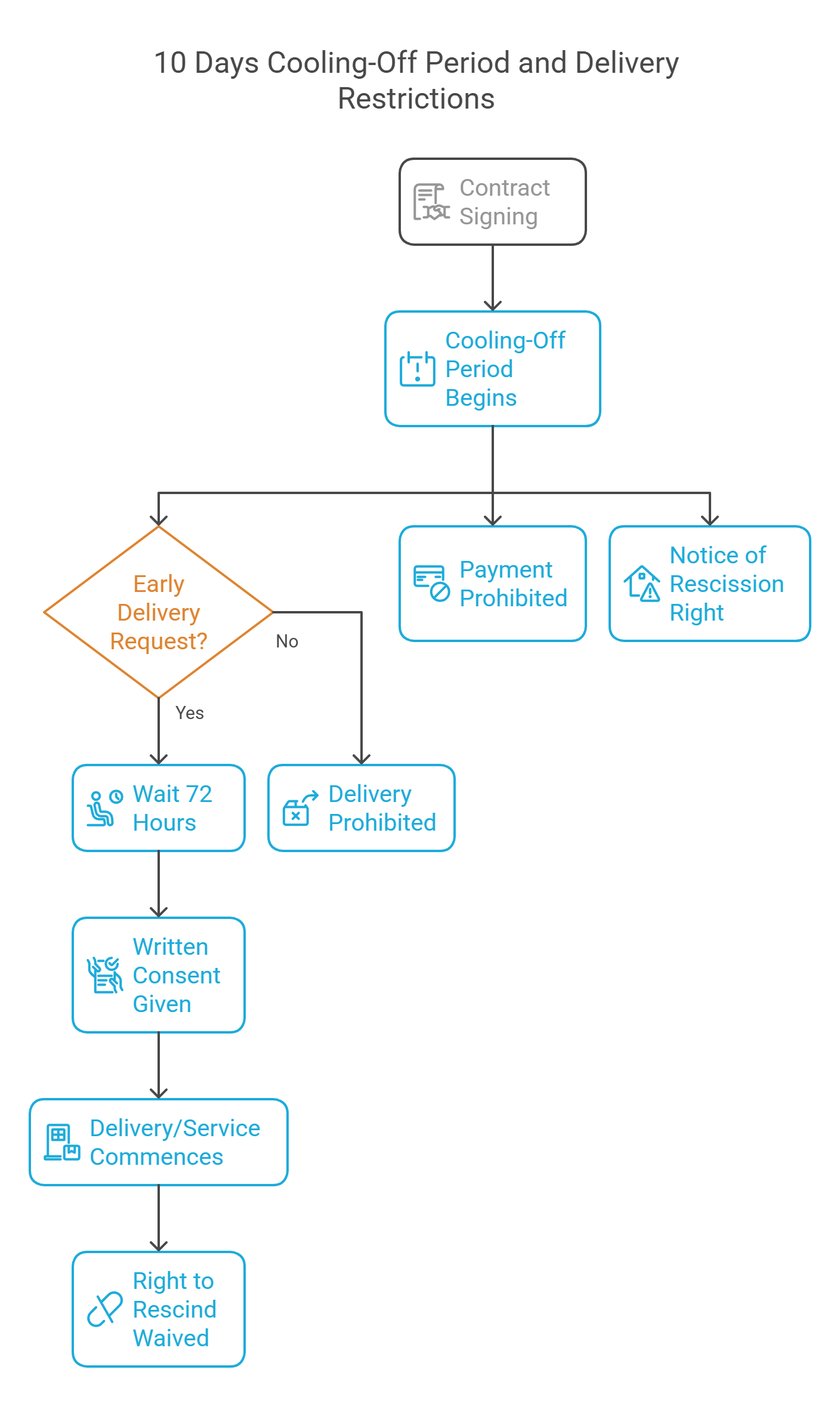Exercitation ullamco laboris nis aliquip sed conseqrure dolorn repreh deris ptate velit ecepteur duis.
- Level 7, Oasis Wing, Oasis Brunsfield Tower 3, No. 2, Jalan PJU 1A/7A, Oasis Damansara, 47301 Petaling Jaya, Selangor.
- +6011-6862 8823
Direct Sales Contact – Cooling off Period & Waiver of Right to Rescind Contract
-
Network Marketing > Licensing & Regulatory > Direct Sales Contact – Cooling off Period & Waiver of Right to Rescind Contract
 Licensing & Regulatory
Licensing & Regulatory
Direct Sales Contract – Cooling Off Period & Waiver of Right to Rescind Contract
Understanding Sections 24 to 27 of the Direct Sales and Anti-Pyramid Scheme Act 1993
The Direct Sales and Anti-Pyramid Scheme Act 1993 in Malaysia serves as a regulatory framework to ensure ethical and transparent direct sales practices while protecting consumer rights. Sections 24 to 27 of the Act specifically address the content of direct sales contracts, cooling-off periods, and the effects of rescission. These provisions aim to provide clarity, fairness, and consumer protection in direct sales transactions.
Section 24: Contents of Direct Sales Contracts
This section mandates that direct sales contracts must include essential details to ensure transparency and prevent deceptive practices. A valid direct sales contract should contain the following:
Detailed Description of Goods or Services – The contract must clearly outline the nature and specifications of the products or services being sold.
Contractual Terms – It should specify the total cost the purchaser is expected to pay. If the total amount is not ascertainable at the time of contract formation, the method for its calculation must be provided.
Payment Terms – The contract should mention the mode, schedule, and location for payment transactions.
Delivery Timeline and Method – It must state when and where the goods will be delivered or when the service will be performed.
Rescission Rights – The contract must include a notice informing the purchaser of their right to rescind (cancel) the contract within the cooling-off period.
Failure to comply with these requirements renders the contract void, protecting consumers from unfair or misleading agreements.
Regulation 12: Requirement of Direct Sale Contract
According to Regulation 12 of the Direct Sales Regulations 1993, any contract for a door-to-door sale, including mail order sales, must comply with Section 23(1) of the Act if the goods or services provided are valued at RM300 or more. This regulation reinforces the importance of clear contractual terms, ensuring that contracts meet the statutory requirements to protect both parties.
Example of Practice
Scenario: A direct sales agent selling a home water purifier visits a customer’s house and offers a contract. The contract clearly states the product details, total price, payment installment plan, delivery date within 10 days, and includes a rescission clause stating the customer has 10 working days to cancel. The agent ensures the customer receives a signed duplicate of the contract immediately.
Section 25: Cooling-Off Period and Restrictions on Delivery
The cooling-off period is a crucial consumer protection mechanism. Under this section:
Direct sales vendors are prohibited from delivering goods or performing services during the cooling-off period (except when expressly requested by the purchaser).
The cooling-off period is set at ten working days from the contract date.
If a purchaser provides written consent for early delivery or service commencement before the expiry of 72 hours from contract signing, they waive their right to rescind the contract.
Vendors are prohibited from accepting any payment or deposit from the purchaser before the cooling-off period expires.
Any violation of these provisions constitutes an offence under the Act, ensuring consumers have sufficient time to reconsider their purchases without financial risk.
Early Delivery or Service Commencement Before the Expiry of 72 Hours
The Act allows purchasers to waive their right to rescind a contract if they provide written consent for early delivery or service commencement. However, such consent cannot be given before 72 hours have passed from the contract signing. This provision is designed to:
Prevent high-pressure sales tactics where customers are rushed into giving up their rescission rights.
Give customers at least three days to reflect on their purchase before deciding to receive the goods or services early.
Ensure that purchasers make an informed decision without immediate influence from the seller.
Example of Practice
Scenario: A customer signs a contract for a home cleaning service on Monday at 10 AM. Under the Act, the service cannot begin until the cooling-off period expires (10 working days). However, if the customer wants the service to commence earlier, they must wait at least 72 hours (until Thursday at 10 AM) before providing written consent. If they sign the waiver at that point, the cleaning service can begin immediately, and they lose their right to rescind the contract.
Regulation 13: Notice of Right of Rescission
Regulation 13 mandates that a notice informing the purchaser of their right to rescind the contract before the expiry of the cooling-off period must be included in the contract. This notice must be printed in Part I of Form AJL-3 in Schedule C and in a font size no smaller than 10-point Times. Additionally, if the purchaser wishes to rescind the contract, they must use the notice format provided in Part II of the same form.
Example of Practice
Scenario: A customer purchases a skincare set through a direct sales consultant. The consultant explains that the products will only be delivered after 10 working days unless the customer signs a written waiver. The customer later decides not to proceed and cancels within the cooling-off period without penalty.
Section 26: Right of Rescission
This section gives consumers the right to rescind a direct sales contract within the cooling-off period. To exercise this right:
The purchaser must serve a written notice of rescission to the vendor.
The notice can be delivered in person or sent via registered post to the vendor’s address as specified in the contract.
If sent by registered post, the notice is considered served three days after posting.
This provision is designed to safeguard consumers from high-pressure sales tactics and impulse purchases, giving them an opportunity to reconsider their decision without financial penalties.
Example of Practice
Scenario: A customer buys a kitchen appliance through a direct seller but later regrets the purchase. Within five days, the customer sends a registered letter to the seller requesting contract cancellation. The contract is deemed rescinded, and no payments are required.
Section 27: Effect of Rescission
When a consumer rescinds a direct sales contract under Section 26, the following effects apply:
The contract is deemed null and void, as if it never existed.
Any associated guarantee agreements linked to the contract also become void.
This section reinforces the consumer’s right to withdraw from a contract without facing legal or financial consequences, ensuring fair treatment in direct sales transactions.
Example of Practice
Scenario: A customer purchases a gym membership package through a direct sales agent but changes their mind. They send a rescission notice within the cooling-off period. As a result, the contract is voided, and any accompanying financial obligations, such as automatic bank deductions, are also canceled.

Categories
- Compensation Plan (11)
- Direct Sales MLM Business (12)
- Licensing & Regulatory (10)
- MLM Software System (2)
